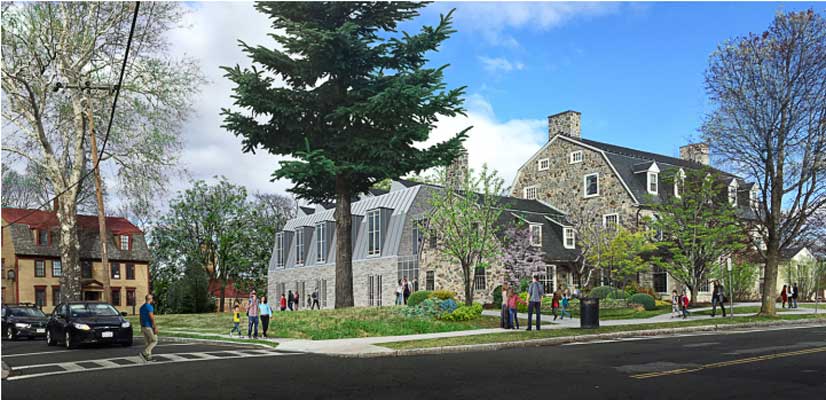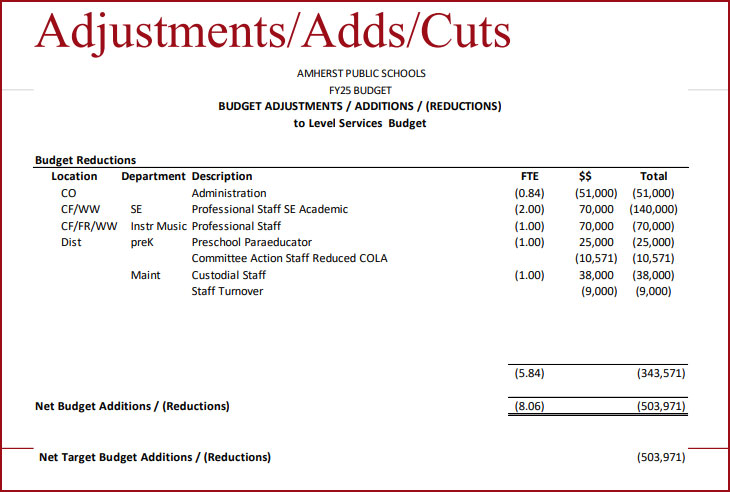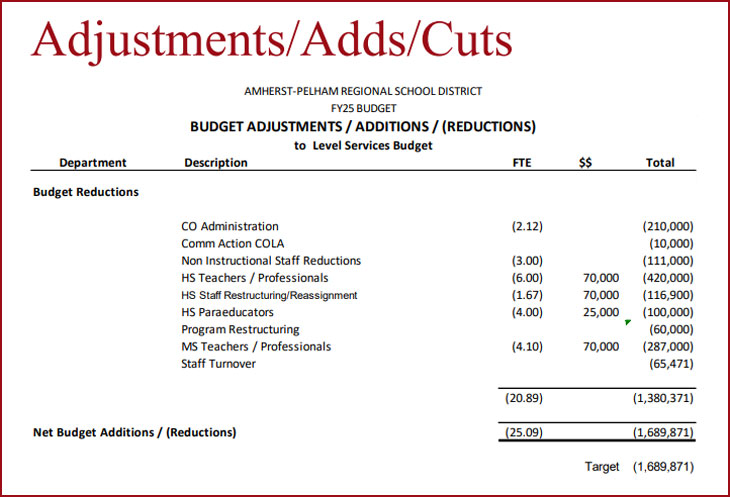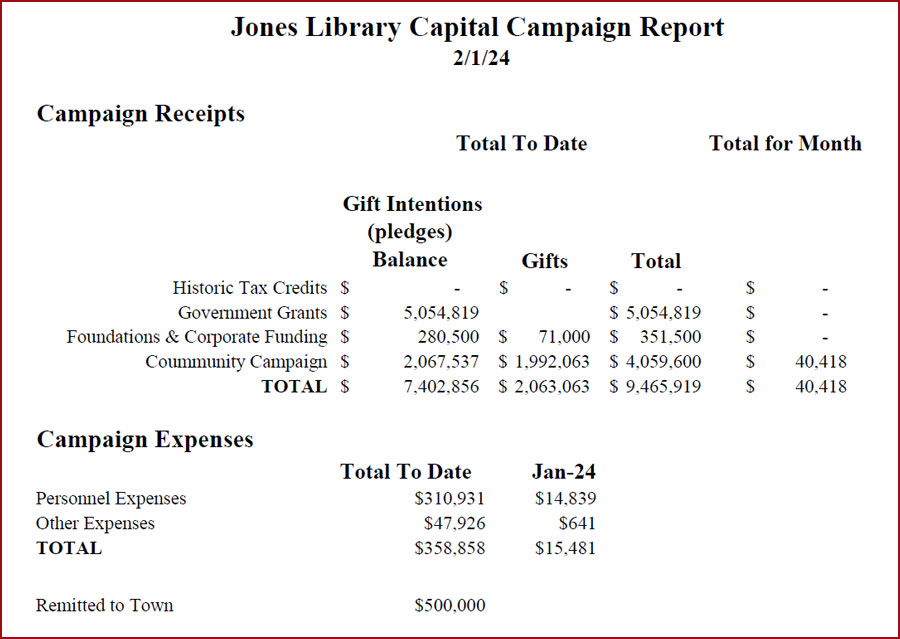Opinion: The Jones Library is Eating the Schools’ Lunch

Photo: https://www.joneslibrary.org/
Amherst Public Schools Face Painful Cuts and a Fiscal Cliff
Home to two colleges and the state’s flagship university, Amherst is known for the value it places on public education. However, as the town’s FY25 budget projections solidify, it is becoming clear that the educational programs at Amherst’s Elementary and Regional Schools are under threat.
Recent school committee meetings have disclosed the need to address a total public school budget gap of $2.19 million.

The elementary schools are facing a level funding shortfall of $503,971. Superintendent Doug Slaughter has proposed cuts that include two special ed professionals, the fourth-grade musical instrument teacher, and the possible elimination of Debbie Westmoreland’s administrative role. Curtailing of after-school programs and larger class sizes have also been discussed. Expenses will be offset by $400,000 of American Rescue Plan funds, but this revenue source won’t be available after this year – the so-called “fiscal cliff.”
The Regional Middle and High Schools are facing the loss of 20 staff to make up a gap of $1,689,871. Amherst’s recent agreement to increase its regional assessment by 1% will help but does not come close to providing level services.

While neither state Chapter 70 aid nor a decision on budget cuts have been finalized, the financial picture for Amherst schools is not pretty and can be expected to remain that way for years to come.
As School Services Shrink, the Jones Library Expands
At the same time the Amherst Town Council has steadfastly pushed the controversial Jones Library renovation-expansion plan forward. In December the Council authorized borrowing $46.1 million for the project and absorbing another $9 million in interest payments over the next twenty years. Officials have presented a cash flow model that projects the town spending upwards of $1.2 million per year from its tax levy through 2044. And if the Library Capital Campaign fails to raise the $13.8 million that it has promised, the town will be on the hook for even more.
A substantial cost of the library project comes from adding 15,000 square feet to the existing building, an enlargement that is not supported by declining usage data nor a public survey showing that an overwhelming majority of patrons are happy with current library services.
Why is the Jones Library, which is not even owned by the town, and which has an $8.5 million endowment and an energetic corps of fundraisers, treated so generously while Amherst’s proud school system must endure painful cuts and see its programs diminished?
Chalk it up to four highly effective, if short-sighted, promoters of the project.
Capital Campaign Co-chair Kent Faerber may be Western Massachusetts’ premier fundraiser. He honed his powers of persuasion as Amherst College’s Chief Development Officer and has acquired influential friends in high places. He has convinced town leaders that the Capital Campaign will raise nearly $14 million as its share of the project, though to date the town has received only $800,000.
Ginny Hamilton, who draws a salary from the Capital Campaign as its manager, has worked to keep Amherst’s political forces aligned with the project. She is an organizer and past co-chair of the PAC Amherst Forward which has helped pro-library-expansion candidates such as Town Council President Lynn Griesemer and former Finance Committee Chair Andy Steinberg get elected.
Austin Sarat, an Amherst College professor, has presided over the Library Board of Trustees since before the building project was conceived in 2014. He has ruled with a single-minded determination to see the project through, regardless of public objections or financial deficiencies.
Library Director Sharon Sharry has persistently trumpeted the need for the building project, largely to address long-neglected maintenance and repairs that have been deferred by the trustees. Sharry does not live in Hampshire County and may not appreciate Amherst’s budget priorities or residents’ property tax burden.

Sadly, the Town Council and Town Manager don’t appear to put much stock in the “sunk cost fallacy,” a decision-making trap that my son learned about in Mr. Fricke’s high school economics class. It warns against irrationally throwing good money after bad. With cost estimates $10 million over budget, the Council, in a 2022 vote split along party lines (Amherst Forward vs independent candidates), approved moving ahead and investing $1.8 million in design services, despite not knowing what the final project cost would be and whether the town could afford it.
To this day there is no “Plan B.” The library construction project has gone out to bid, with general contractor proposals due by March 6. If the lowest bid is more than $46.1 million, the Council will need to appropriate even more money, or find ways to cut costs from a design that has already seen severe compromises in materials and furnishings.
The victims of this runaway train will be Amherst’s schools, its roads, its deteriorating Public Works facility and Central Fire Station, and the many other vital services on which residents have come to rely.

Sometimes the only ethical way to handle a runaway train is to derail it:
https://www.mass.gov/info-details/attorney-generals-false-claims-division#:~:text=Using%20the%20Massachusetts%20False%20Claims,fraudulent%20claims%2C%20records%20or%20statements.
thank you both Jeff and Rob. what must we do to pull the plug on this Jones library expansion? what else can we do to prevent more town money being spent on the expansion? I kept hoping Town Manager Bockelman would speak up regarding the financial situation. but he hasn’t.
The article above was well written and it sums up how many of the older folks feel.
Our Roads are getting poorer and poorer. The Public Works Project is not getting any traction. The overall maintenance of Our Recreational Facilities, guard rails in several locations and bridge on Station Road are not even on the ‘to do list’. The Senior Center like our Seniors are taking a backseat to these expensive spending programs.
We are not Boston or Cambridge, so stop spending as though we are.
Our Real Estate taxes continue to increase and are pushing our Seniors out. Too many decisions are being made withouts a proper analysis of Debt, Need and a Future Logical Approach. This is not the Amherst that I grew up in 1957.
This situation is truly a disgrace. I am at a loss as to why people can’t connect the dots between school budget cuts that no one wants and an overpriced library project that we don’t need. I will never understand why the Town council can find endless money for the library project but not enough to pay the actual human beings who teach our children. As a parent and taxpayer you can bet I will be showing up at the Regional School Committee meeting tomorrow night to voice my opinion about these cuts. The School Committee should let the town council know that these cuts are NOT acceptable and that they need enough money in the budget to continue to staff our schools at the level they need to be staffed at. Period. Otherwise, this sad story is going to repeat itself year after year as upset parents show up to school committee meetings to hear the sad rendition of what we’re cutting this year, yet there is “absolutely nothing that can be done about it” while the $46.1 mil library project remains unquestioned and unchallenged by the town councilors who “represent” us.
It is astounding to realize that the need for a building to house books, etc., has become so vital to so many. Shutesbury is facing a similar dilemma. Shutesbury does not need a new library. -The one here is a quaint, well-built, wonderful, building. With a little tender loving care-it could have running water and expand. Though the water in that part of town is contaminated with PFAS so it is not drinkable. It’s curious how they ruled out all possibilities of working with the building as it is now. Its composting toilet– that if operated properly (the library director once stated it was a “failed” project) would not only save water but set the example of the need to conserve a finite natural resource. It is amazing that the town received a grant from the MBLC to build a new public building when the one housing our elementary children had a leaky roof. I always thought that if proper maintenance could not be kept on a school housing the most precious beings on earth-how could this same town expect to maintain a brand-new building. Shutesbury cannot afford a new library. I do not know where they are getting the money as the costs continue to rise. I do know that when I approached the school speaking about clean/organic foods-the first thing I heard is talk of the high costs-it costs too much-the budget cannot be burdened with the high cost of organic foods-we don’t have that kind of money-and so on. 🙁 When I read the title of this article-I was excited to see the analogy. Same can be said about Shutesbury. The MN Spear Library- (new name to be determined I can only guess) is eating the school’s lunch!